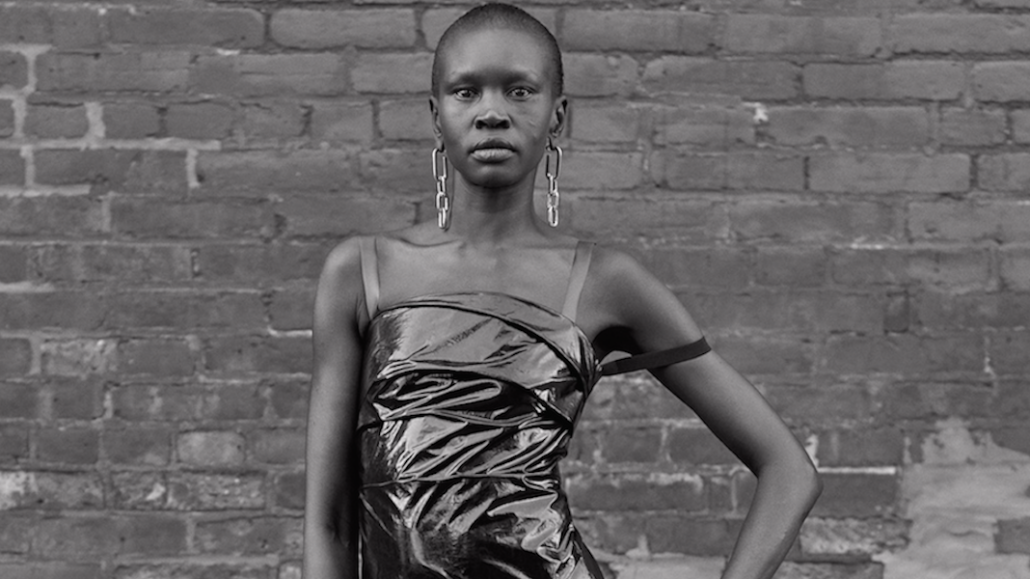Secure your place at the Digiday Publishing Summit in Vail, March 23-25
Why Helmut Lang hired an editor-in-residence in place of a creative director

In 2016, more than a decade after designer Helmut Lang quit his namesake brand, current CEO Andrew Rosen was in need of a new creative director, as well as a refreshed identity. The legacy label, which dominated the New York City fashion scene in the ’90s, had lost its way among the new generation of shoppers after Lang left and ownership shifted from the Prada Group to Theory’s holding company, Link Theory, to Uniqlo parent Fast Retailing.
The typical move would be to hire a high-profile designer to take the brand in a new direction. Instead, with the help of Framework, the creative and strategic division of the agency and PR hub Black Frame, the brand chose to imitate the structure of a magazine, positioning its first “editor-in-residence” at the center of the brand, instead of a creative director.
Isabella Burley, the 26-year-old editor-in-chief of Dazed & Confused magazine, was brought on to the brand in March to lead its structural relaunch alongside Rosen. Under Burley (who is still the editor of Dazed), the brand is launching three new projects: an ongoing archive collection from the brand’s early days, a series of artist collaborations and a designer residency program. The brand plans to hire contemporary designers for a limited amount of time, tasking them with creating collections for the brand that are inspired by its legacy. First up is Hood By Air’s Shayne Oliver, who has a Spring 2018 and a pre-spring collection in the works.

Helmut Lang’s new brand relaunch campaign
“Instead of following the current fashion brand model, which is the creative director model, the idea was: What if you had an editor at the center?” said Burley. “I’m responsible for the creative direction across all departments, but I’m not the creative director. It’s in line with the way you put a magazine together: You choose the best people to be in charge of certain projects, but with one holistic, editorial point of view throughout. It’s a new way to approach a brand structure.”
Helmut Lang’s relaunched business model could be a reprieve from luxury’s current, ongoing creative director carousel. As struggling brands continue to bring in big-name designers, pit them against staggering expectations to right ship and improve sales, then spit them out when they fail to do so over the course of a few collections, little progress is made. Helmut Lang, by contrast, is hoping an editor who oversees several company projects will carve out a new point of view without burning out any one designer.
The brand’s new archive project will also ease pressure on designers to churn out collections. While there’s no set seasonal calendar for the brand’s resident designers, 15 Helmut Lang pieces from past collections will be released online and in stores every four months.
Helmut Lang’s new brand structure also marks the second time Rosen has rethought the typical model for how fashion brands operate: At Theory, where he also serves as CEO, Rosen rolled out Theory 2.0, a in-house initiative that brought together representatives across departments to oversee the concept, design, marketing and distribution of one capsule collection, from start to finish.
“[Rosen] has been very trusting in the team to lead these projects day to day,” said Burley. “It’s storytelling, but not in the form of some brand content blog. We want to give people something they might not know about, a new story for a legacy brand through ongoing projects, in a digital-first way.”
Burley worked with Rosen, as well as the brand’s design lead Selina Elkuch, to format the different ways new collections and campaigns would take shape. The overarching strategy is the Helmut Lang brand “seen by” new artists, designers and photographers. It’s a way to tug on the brand’s history while introducing it to a new group of followers, she said.
Along with the ongoing archival, artist and designer projects, the brand released an updated website and social strategy this week, both based around a gender-bending new campaign shot by Ethan James Green that’s meant to mark the brand’s reset. Dazed magazine writer Ava Nuiry is in charge of all of Helmut Lang’s social media accounts. On Instagram, Nuiry is known as @avanope, where she’s gained 168,000 followers for her posts featuring fashion logos on everyday items, like old Reebok sneakers and white sweatshirts.
“Few other companies have the stories to tell that Helmut Lang does. That sets Helmut Lang apart,” said Brian Phillips, president and creative director of Black Frame and Framework. “[From] 2006 to 2016, the brand did not engage with its own history in a meaningful way. Part of the current mission is to convey what Helmut Lang stands for and how it relates to fashion, pop culture and visual culture.”
More in Marketing

Why Edward Jones’ agentic AI trial comes with limits
Edward Jones tests agentic AI to drive marketing productivity, taking a measured approach as it stops short of full automation.

Footwear brands navigate uncertainty after latest tariffs flip-flop
Some 99% of footwear sold in the U.S. today is imported, according to the Footwear Distributors and Retailers of America.

Brands at eTail Palm Springs share lessons on the ‘messy middle’ of building AI tools
Here’s a rundown of lessons brands have shared about their AI implementations so far.









